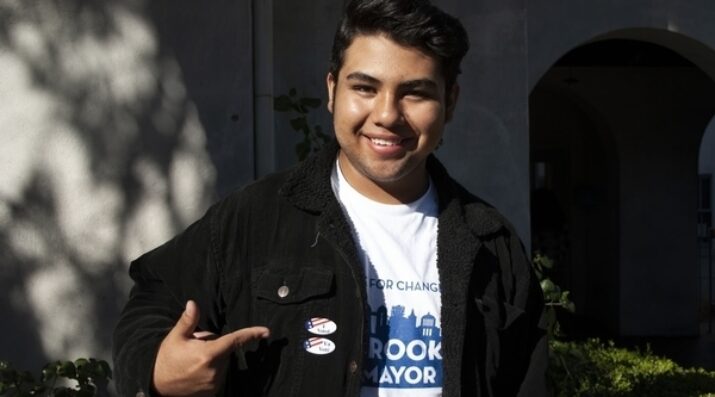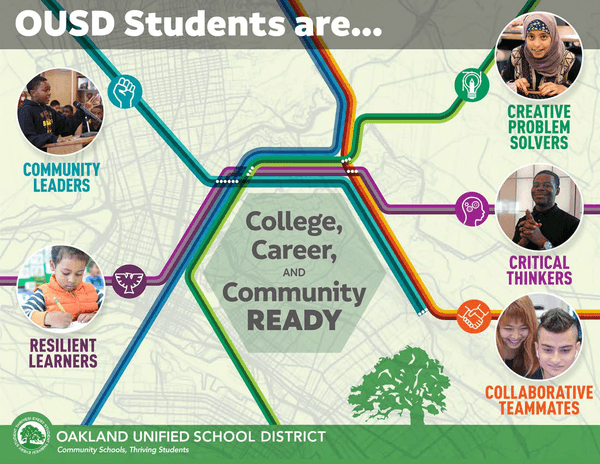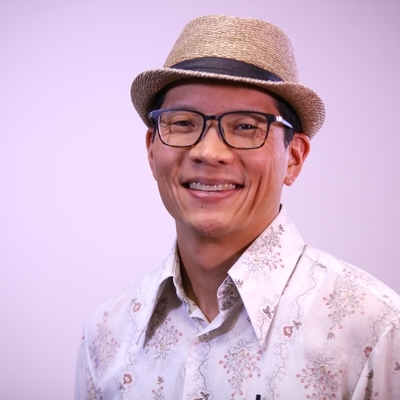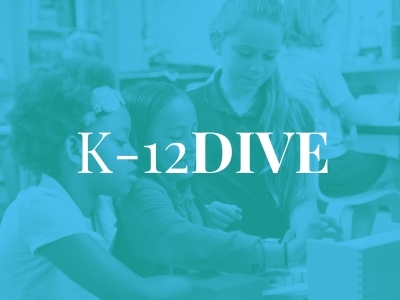Oakland's Graduate Profile: A Spotlight on What Matters Most
Topics

Today’s learners face an uncertain present and a rapidly changing future that demand far different skills and knowledge than were needed in the 20th century. We also know so much more about enabling deep, powerful learning than we ever did before. Our collective future depends on how well young people prepare for the challenges and opportunities of 21st-century life.
A graduate profile can help build coherence for a school district by focusing instruction on what truly matters. To create its graduate profile, Oakland Unified listened to students, alumni, and teachers and is now aligning resources toward the vision it set.
This past spring, Leonardo Quezada and hundreds of students in Oakland crossed the graduation stage with proud families in the audience. Graduation is a huge accomplishment, and yet, it does not guarantee that a student is ready for what comes next.
In Leonardo's case, I'm confident that he is prepared. How do I know? Did I look at his grades on AP exams or in community college classes? No.
Instead, I spent a couple of hours interviewing him for a podcast series called "The Young and The Woke" for which I talk to students in Oakland whose school experience has helped them develop a clear sense of purpose.
We never once talked about his grades in school, but he did tell me about his life.
He was homeless for several years until his family was able to get a home through the Oakland Housing Authority. At school, he became interested in nutrition through the Health Academy at Oakland Technical High School, which led him to participate in a successful campaign to pass the Good Food Purchasing Resolution in 2016. He had to work with peers and adults to advocate for a complicated piece of policy that expects the district to purchase food based on factors like transportation, treatment of animals, labor practices, and nutrition. This experience sparked a passion for politics, which led him to volunteer for Oakland mayoral candidate Cat Brooks.
His story reminds educators that we aren't just teaching content and skills. We are also helping young people awaken to their purpose in the world. Our students need a quality, rigorous education along with access to resources provided by a robust public sector and access to leadership opportunities and networks like those provided by his volunteer work.
True readiness for life after high school cannot be measured by test scores but instead by qualities like resilience, collaboration, leadership, critical thinking, and creative problem-solving. These five traits are what Oakland Unified School District (OUSD) names in its new graduate profile, which is a document that articulates what we are committed to providing to our students:

Focusing Instruction on What Matters Most
Why might a district want a graduate profile? Simply put, it can help build coherence by focusing instruction on what truly matters.
Imagine all the skills embedded within the Common Core State Standards, Next Generation Science Standards, Career Technical Education (CTE) Model Standards, and College, Career, and Civic Life Framework. Plus, OUSD has Social and Emotional Learning competencies. When put together, there are easily hundreds of skills, which can be overwhelming for teachers.
A district graduate profile can help teachers wade through these lengthy frameworks by putting a spotlight on what to teach, and more importantly, how to teach. By highlighting traits like leadership and collaboration, we are saying that it is important for educators to give students opportunities to take action to solve issues in their community and to learn to communicate effectively and resolve conflicts when working in groups.
A recent example occurred when students at Oakland High School in the Law and Social Justice Academy worked with an affordable housing developer on a Y-PLAN project. They visited the site of the proposed project and then conducted research to find out what the community would like to see in the housing development. For the final presentation, the students created proposals that they shared when the developer came to their classroom.
This is not to say that standards do not matter. Standards matter greatly because they are the tools that all of us use to complete meaningful work. In the affordable housing project, students were working on skills from both the Common Core State Standards and CTE Model Standards, but these skills were given meaning because they were being used in an authentic context.
We should think of standards as a means toward an end rather than as an end in themselves. While standards are important, OUSD's graduate profile helps us all remember that the true goal of education is not proficiency on Common Core State Standards. The true goal is instead a more holistic vision of students as resilient learners, collaborative teammates, community leaders, critical thinkers, and creative problem solvers.
Focusing Resources on What Matters Most
Not only can a graduate profile spotlight what matters most to teach, it can also provide the same kind of focus for our state, our district, and external partners. What if the state shifted away from using standardized assessments as the primary measure of success and instead put its attention on supporting districts to cultivate skills like those named in OUSD's graduate profile? What if external partners supported coherence in our district by contributing resources aligned to the graduate profile?
As the graduate profile becomes more widely adopted in our district, we will align ourselves toward a vision for public education where career readiness and community readiness is as important as college readiness. By taking a more holistic approach, we will better be able to serve more of the students who are homeless, healing from the trauma of violence, and on the verge of dropping out.
Students might no longer experience school as a solitary building where they are talked at, disciplined, and tested. Instead, school would function more like a grand transit station where students, teachers, and mentors come together to learn from one another and where they regularly leave to study real-world problems and work collaboratively to implement solutions.
Leonardo's success story is increasingly more common. OUSD celebrated an 8 percent increase in graduation over the past two years to 74 percent. If we can rally families, students, teachers, and leaders around our graduate profile, we can get to the next level—there will be more and more OUSD graduates who possess the qualities of our graduate profile and who enact them to realize their purpose in life.
Photo at top: Oakland Unified student Leonardo Quezada proudly points to the "I voted" stickers on his jacket. (Courtesy of Young Whan Choi)




